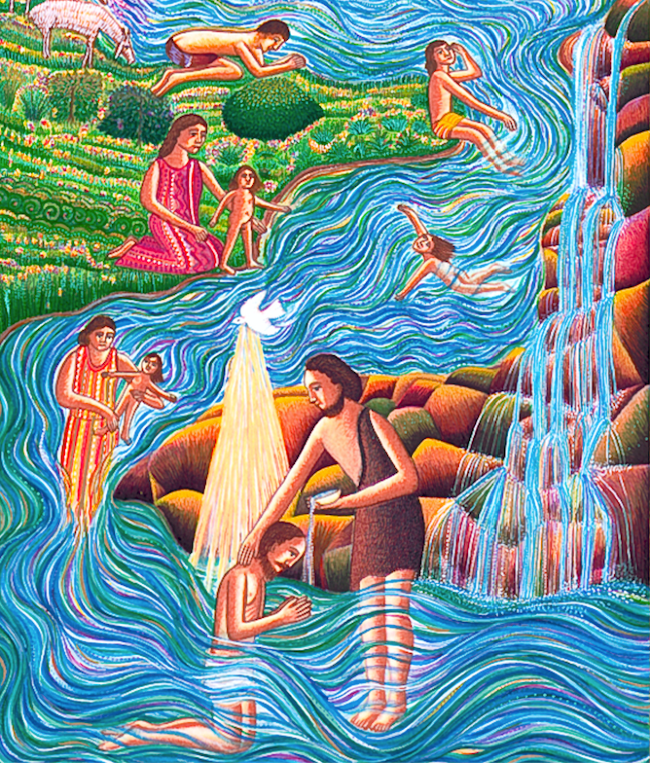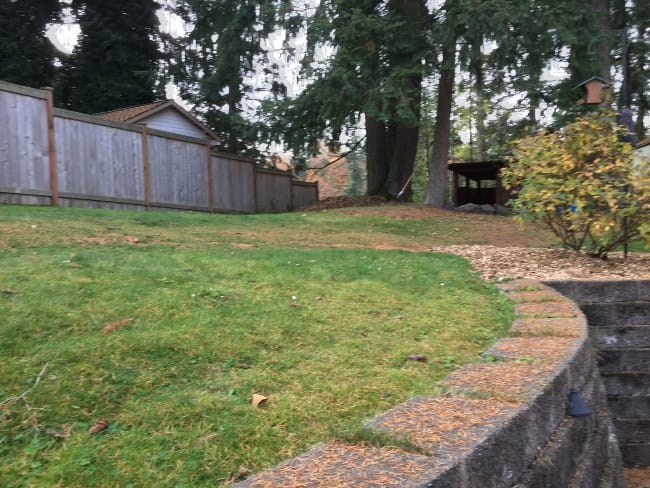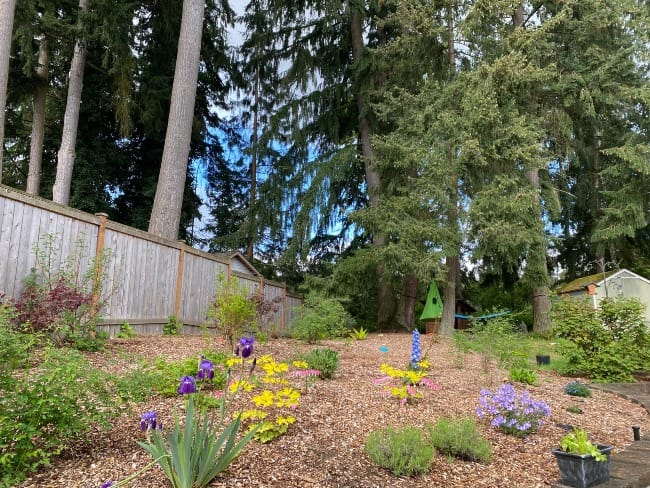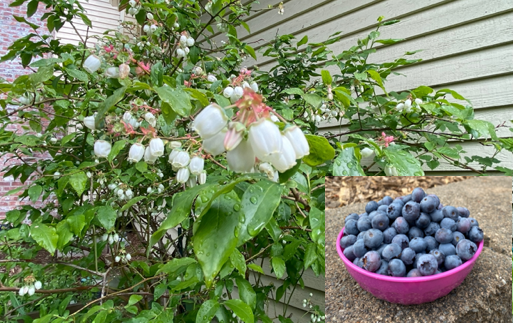In my last post, I offered an overview of what ecological discipleship looks like and introduced a four-step process that ecological disciples incorporate into their daily lives: repent-reimagine-reform-repeat. This post explores the first step: repentance. Not exactly a fun topic, but I hope you will see by the end that repentance is not only necessary, it is sweet.
When we moved into our current home in Redmond, WA, the planter that runs alongside the front porch was very overgrown. When I began cleaning it up, I discovered a plant lying completely flat under a thicket of growth. It was alive, and desperately creeping eastward along the ground toward the only shafts of sunlight that grace this area. Something about its tenacity spoke to me, and I resisted pulling it out. I learned it was a blueberry bush, and decided to transplant it to the south side of the house, where more sunlight and better soil would give it a chance to become what it was created to be. Transplantation is a risky endeavor, but for this bush to bear fruit a major change was necessary.
All four gospels include stories about John the Baptist preparing the way for Jesus’ public ministry. It is no mistake that John located his work on the western edge of the Judean wilderness; people from Jerusalem and the surrounding areas needed to uproot themselves from the city and move away from Israel’s political and religious power center. John knew that the nation needed reform; many people were struggling like that blueberry bush under the weight of oppressive laws and requirements (from Israel and Rome), desperately reaching for the few shafts of hope that filtered through the social strata.

As people made their way down the rocky western slopes from Jerusalem to the Jordan River, they would most likely have found John in an oasis of green, with lush trees, plants, and grasses growing by the river. It is not a stretch to imagine fig trees along the banks, laden with their fruit. As the people came, John had a simple message: “Repent, for the kingdom of heaven is near” (Mt. 3:2). God was about to begin a new work, and it was time for people to examine their lives and make the changes necessary to align themselves with what was coming. When some religious leaders showed up, his message to them was not subtle:
“Produce fruit in keeping with repentance.”
John made it clear that repentance is for everyone, perhaps especially for those in positions of power and privilege. He also made it clear that it is not simply a change of mind or heart; it requires action with clear results that bless and nourish the world. For ecological disciples, repentance that produces such fruit follows three specific steps.
Step 1: Confessing that we have abandoned our common vocation of earthkeeping.
The only biblical vocation given to all human beings is earthkeeping. While some cultures, and some individuals, have embraced this calling as central to their identity and way of life, most modern cultures, most individuals, and certainly the majority of Jesus followers have not. The consequence of this neglect has been increasing disharmony within our hearts, homes, communities, ecosystems, and planet. We are not the people we were created to be.
The path to becoming fully human beings begins by acknowledging that we have left the path and need to change direction. A good place to begin might be looking with ecological lenses at the prayer of confession I repeated every week of my childhood at St. Paul’s Episcopal Church in Lancaster, NH.
Most merciful God,
we confess that we have sinned against you
in thought, word, and deed,
by what we have done,
and by what we have left undone.
We have not loved you with our whole heart;
We have not loved our neighbors as ourselves.
We are truly sorry and we humbly repent.
For the sake of your Son Jesus Christ,
have mercy on us and forgive us;
that we may delight in your will,
and walk in your ways,
to the glory of your Name.
Amen.
Notice that this is a corporate prayer. Personal confession is necessary, but ecological disciples recognize that we are not simply individuals living solitary lives; we are enmeshed in families, communities, ecosystems, the earth, and the cosmos. Our individual and communal identities and actions are always overlapping and intersecting – we are “in it together,” and that includes sharing the burdens of our shortcomings.
The simple phrase, “We have not loved our neighbors as ourselves,” becomes quite expansive through ecological eyes. Our understanding of neighbor needs to stretch beyond our fellow humans to include all creatures with whom we share the world – and when we include them in our confession, we acknowledge with regret that we have certainly not loved them as we have loved ourselves. This notion of neighborliness was a central insight of St. Francis; you can read his beautiful Canticle of Creation in a recent post by Louise Conner.
A final observation is that the prayer tells us to seek mercy and forgiveness so that “we may delight in your will, and walk in your ways.” The process of repentance may not be delightful, but the fruit of it is. Getting there, however, requires deliberate action.
Step 2: Moving toward harmony.
Harmony happens when we are living in right relationship with our Creator and our neighbors (expansively defined). This is, in many ways, the biblical meaning of salvation. We experience this harmony on a continuum; it is both a destination and a path to travel. Moving toward harmony requires moving from confession to actions that reflect God’s love and care for creation. Over time, these actions begin to move us along the journey of repentance. We begin to internalize our vocation as earthkeepers so that it becomes central to our identity and way of life.
We are all at different stages of this journey, with different gifts, capacities, and limitations. I find it helpful to think about moving toward harmony in three categories.
Small changes that require minimal sacrifice and bear enough fruit to taste the sweetness of harmony. One such change for me has been in the care of my property. I stopped using artificial fertilizer and pesticides on my lawn, and began replacing areas of grass with mostly native plants and shrubs. We do not have the perfect suburban lawn cherished by many of our neighbors, but it is a small price to pay for having a poison-free yard for our kids and local wildlife (both of which like the increased diversity).


There are thousands of small actions that can move you toward harmony: learning about your local ecosystem, choosing to walk or bike instead of drive; beginning your day with five minutes of prayer; meeting a neighbor's need; allowing a neighbor to meet your need; writing to your congressperson or local government representative; choosing a kind word over a harsh remark; removing insects from your home rather than killing them; participating in church and civic life; financially supporting organizations that are fostering harmony. It is tempting to be overwhelmed by the possibilities; I hope you will see instead that you can begin right where you are – just look for the low-hanging fruit.
Medium changes that require more sacrifice and begin to alter your frame of mind and life direction. In 2007, I was called to be pastor of Highland Covenant Church in Bellevue, WA. We bought a beautiful new home about 25 minutes away from the church, but after six months we decided we needed to live in the church’s neighborhood. We sold our new home at a loss and moved to a smaller, older home close to the church. It was not easy, but what we lost was made up for in a locally-focused life that enabled us to form deep relationships, tread a little lighter on the earth, and be fully invested in a community. In other words, this decision bore a lot of fruit. Other medium-sized changes I have seen people take include getting rid of their car, becoming a vegetarian or vegan, becoming a caregiver for ailing relatives and friends, and being the lone voice advocating for creation care in their church. If you are in a position to consider a significant change, it is wise to count the cost, but exciting to see the fruit.
Large changes that require significant sacrifice and alter the shape and direction of your life. In 2017, I left pastoral ministry to lead Circlewood, the organization behind The Ecological Disciple. This changed the nature of my vocation significantly, and moved my family from a place of relative security and safety into an unknown and risky future. I am not intending to hold myself up as a perfect example - many others have taken greater risks. I know people who have left their comfortable and conventional lives to build self-sufficient homesteads and communities, people who have sacrificed a huge portion of their lives - sometimes their actual lives - protecting crucial ecosystems, people who have left everything to live among and serve the poor. I also know that these changes are often undertaken communally; a church in Denver recently decided to return its property to local Native American tribes, a significant and costly act of repentance that is bearing much fruit.
It is important to see these acts of repentance, whether small, medium, or large, as part of a long, often winding journey. Many times, the only way to continue moving forward is to go back to the beginning and start again.
Step 3: Repeat the process.
Western culture tends to think of life and time in a linear fashion. We live, make changes, and move forward - no looking back! But life is better lived in a circular or spiral pattern. We live, make changes, and then come back to where we started as different people, ready to undertake the next part of the journey. It is normal to find yourself thinking sometimes, "Haven't I been here before?"
For ecological disciples, the journey of repentance is like growing a garden. We plant seeds, watch them grow, and eventually enjoy the fruit. Then comes a time of dormancy; life slows down, we reflect on successes and failures, plants are cut back or pruned, soil amendments added, all in preparation for a new cycle of growth that may just yield a greater harvest of fruit. When we commit to and persevere through this process, we slowly become who we were created to be.
Today, I invite you to hear John the Baptist's words - "Produce fruit in keeping with repentance" - as an invitation to harmony and delight. Every act matters, every step counts. When I begin to feel overwhelmed or discouraged, I visit our blueberry bush, which survived its journey and has found a place to thrive.

Each year brings more blossoms and blueberries. It is a reminder to me that the fruits of repentance, both literal and metaphorical, are within our reach, and that both are sweet.
With you on the Way,
James
Next week we will look at the second step - reimagining. But first, consider these reflection questions: Where have you seen the fruit of repentance in your life? In what ways was it sweet? What next step might you take?